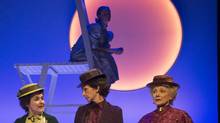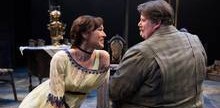Before completing my first shift in the newsroom of the Waterloo Region Record, I was off to Niagara-on-the-Lake to review the opening week of the Shaw Festival. It was late May, 1986. I had just been hired as one of three arts reporters at what was then known as the Kitchener-Waterloo Record. It turned out to be the sixth — and last — newspaper for which I worked over a career spanning four decades.
Although I had reviewed the Shaw selectively two years prior while at the Brantford Expositor, and had been introduced to the festival as a reporter at the Simcoe Reformer a year before that, this was my first assignment as a full-time arts reporter responsible for theatre and the visual arts.
The Shaw was under the inspired artistic directorship of Christopher Newton, a transplanted Brit who had blown the dust off the plays of George Bernard Shaw and his contemporaries, including Oscar Wilde, Noel Coward, J.B. Priestley and J.M. Barrie among others, to present revolutionary theatre in one of Ontario’s most historically rich and picturesquely manicured towns. Newton’s revelatory interpretations transformed charming period dramas into productions of penetrating psychological and emotional, even spiritual, depth.
The festival’s creative standards were second to none, including the work of distinguished designer Cameron Porteous and a gifted cast that featured Heath Lamberts, Tony Van Bridge, Fiona Reid, Barry MacGregor and Nora McLellan among others.
As a result, the festival enjoyed the benefits of critical acclaim including increased attendance and an international profile. It was a glorious time to be reviewing productions at the festival. The Shaw also held special significance for my ex-wife and me. Our eldest son Dylan was conceived during opening week of 1990.
Alas, my annual trips to the Shaw were not to last. At season’s end of 1990 I was informed by my entertainment editor that cost-cutting trumped arts coverage. He revealed his cards when he referred to the festival as ‘Niagara-on-the-Take,’ a derisive nod to the tourist destination’s pricey meals and accommodation. Afterwards the Record relied on the Toronto Star for coverage of the Shaw. Although I continued to cover both the Stratford and Blyth festivals, in addition to Drayton Entertainment, I regretted not covering the Shaw because of the quality of its productions.
Since accepting early retirement last June and establishing a personal blog, one of the things I most wanted to do was return to the Shaw. To serve that end my partner Lois and I recently spent a couple of days at Niagara-on-the-Lake. Thanks to the festival’s generosity, we received complementary tickets for two of my favourite plays — Anton Chekhov’s Uncle Vanya and Thornton Wilder’s Our Town, both of which happened to be appearing on the same day. It was especially gratifying to return in time to experience a small sampling of Jackie Maxwell’s final season as artistic director after 14 seasons.
Sadly both productions proved slightly disappointing, which paradoxically often happens with favourite plays. Perhaps my expectations were too high. I had fond memories of reviewing Stratford Festival productions of Our Town in 1991 and Uncle Vanya in 1992, and I was eager to see what the Shaw had to say about these classics of modern drama.
I’ve always associated the plays of Chekhov with autumn at dusk. The people he writes about — and they are people rather than characters — are bathed in a sadness, a melancholy, a poignancy, a sense of loss that accompany lives of quiet desperation in times of uncertainty when an unknown future impinges upon a vanishing past. We should leave a Chekhov play feeling profound sympathy for the shattered lives we have witnessed in intimate settings. It’s a feeling that embodies maturity when expectation gives way to reflection; it’s a feeling incomprehensible to the young who have yet to taste the bittersweetness of loss, regret and pity.
When Lois, who had experienced Chekhov for the first time, and I were having dinner after the performance, she confided that she had found the play depressing. Her response led me to what I believe is the production’s main problem — American playwright Annie Baker’s adaptation from ‘a literal translation’ by Margarita Shalina of the original Russian text. What we heard in the Court House Theatre was not the heartbreaking lyricism of Chekhov’s words but the dull, mundane speech of HBO. It was not only jarring but unsettling. Like the poetry of W.B. Yeats, Chekhov’s naturalism is tinged with a patina of late romanticism — at least as I read him.
My concerns with Maxwell’s directing which for the most part is solid, as well as the acting which for the most part is excellent, stem from the script. The cast is uniformly strong, featuring Neil Barclay as Petrovich (Vanya), brother of the professor’s first wife who falls in love with the professor’s second wife Yelena; Marla McLean as Sonya, the professor’s daughter and Vanya’s niece who is in love with Astrov; and Patrick McManus as Astrov, the conservation-minded physician who lusts after Yelena; and Moya O’Connell as the beautifully desirable Yelena. Donna Belleville is the ancient matriarch Maria; Sharry Flett is the nanny Marina, Peter Millard is the houseguest Telegin and David Schurmann is the pompous professor Serebryakov.
If Uncle Vanya falls victim to the wrong tone, Our Town falls victim to the wrong colour. American director Molly Smith’s pastiche of Wilder’s Pulitzer Prize-winning meditation on early 20th century, small-town New England fails to compensate for its lack of charm. Her interpretive wrongheadedness is heightened by: (1) Ken MacDonald’s backdrop of bright, garish pastels and white props resembling do-it-yourself assembly furniture from IKEA and a couple of huge step ladders, (2) William Schmuck’s gaudily shiny costumes and (3) James Smiths’ exceedingly loud score.
Smith doesn’t put much stock in Wilder’s script which reflects an acorn-tough, yet big-hearted, Yankee naturalism, equal parts pragmatism and lyricism. Think Robert Frost. Consequently adult actors don’t convince as youngsters, while the actors in adult roles don’t penetrate caricature, with the exception of Benedict Campbell who plays the Stage Manager as a lovable shaggy dog.
The actors mime their actions instead of working with props as usual, but Smith augments this with unnecessary sound effects (for instance doors creaking or slamming). The slow-motion set pieces are equally unnecessary and distracting.
The cast — including Patrick Galligan as Dr. Gibbs, Catherine McGregor as Mrs. Gibbs, Patrick McManus as Mr. Webb, Jenny L. Wright as Mrs. Webb, Charlie Gallant as George and Kate Besworth as Emily — deserves better.
It would be misleading to suggest these misgivings diminished my deep enjoyment of returning to the Shaw Festival. Lois and I plan to return again, always hopeful of the revelatory theatre I remember so fondly.
Information on the Shaw Festival
and tickets are available at 1-800-511-7429 or online
(Featured image is scene from Our Town)



